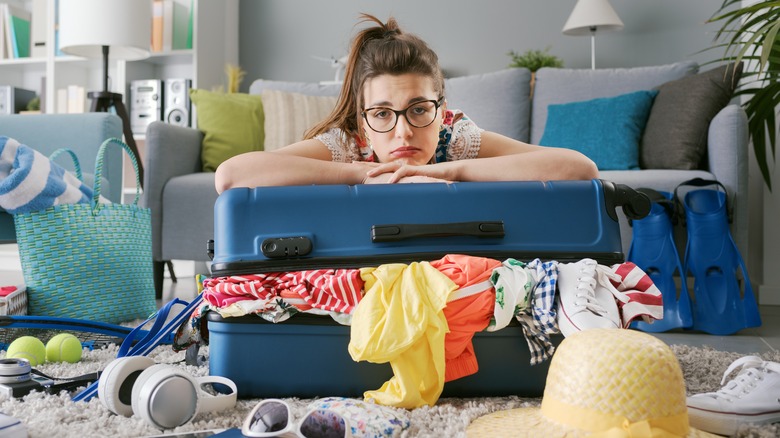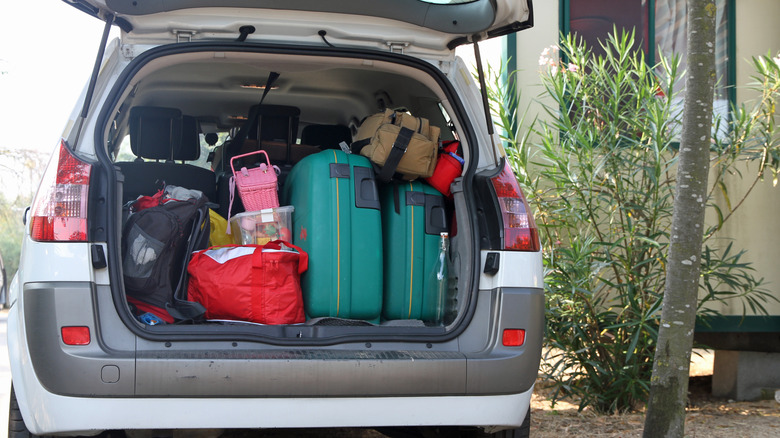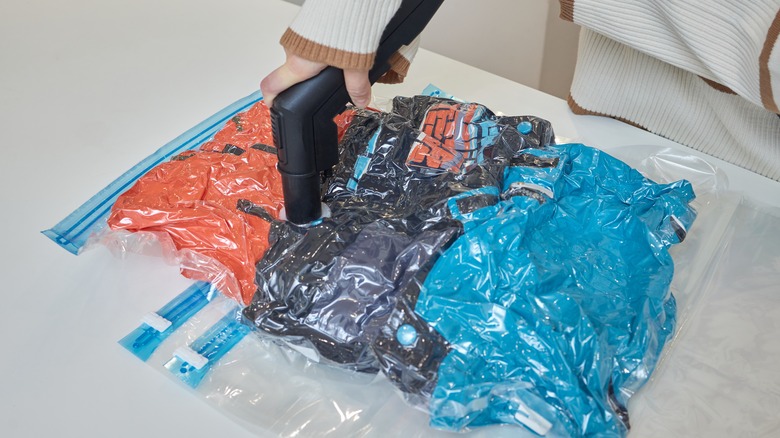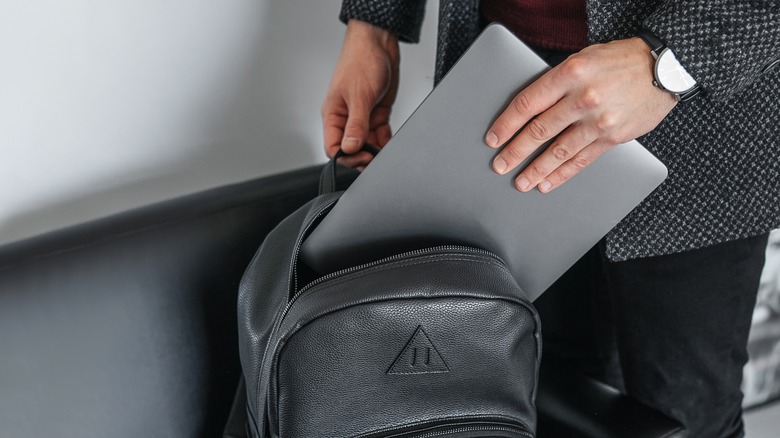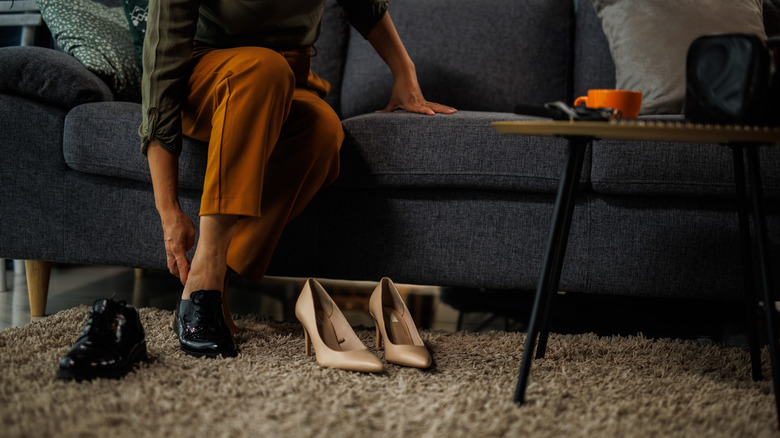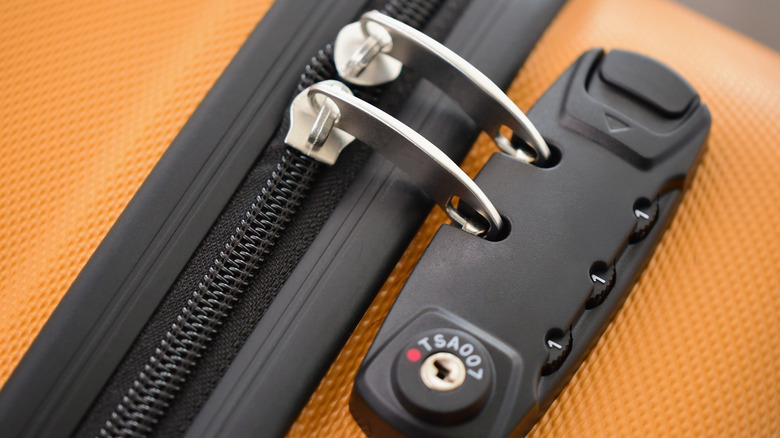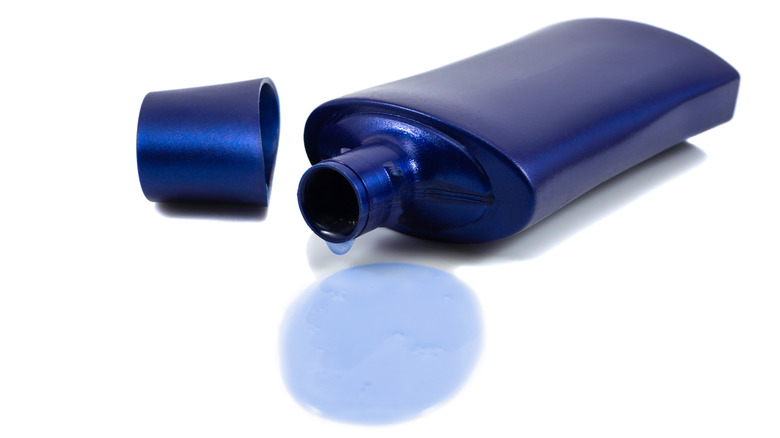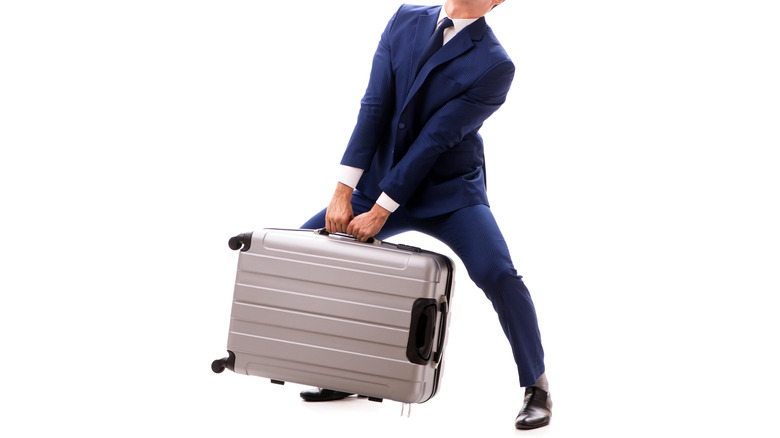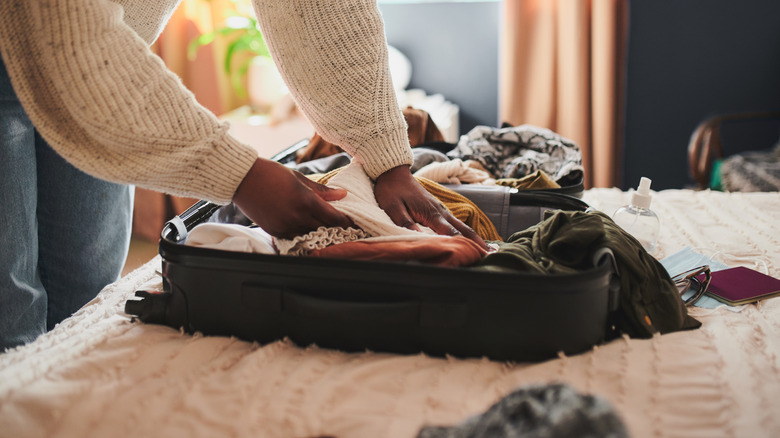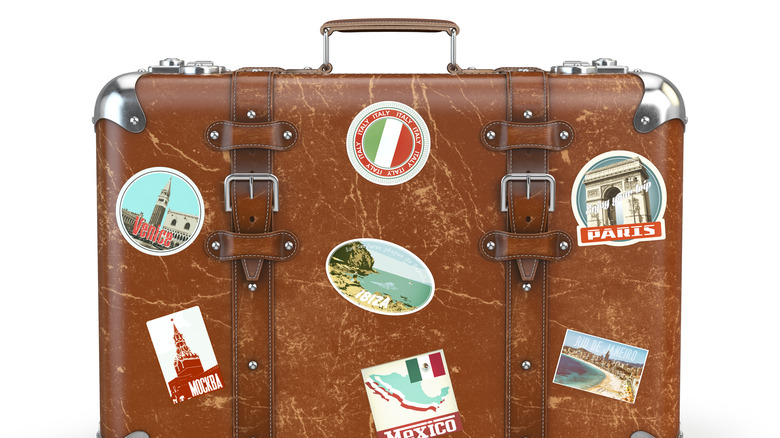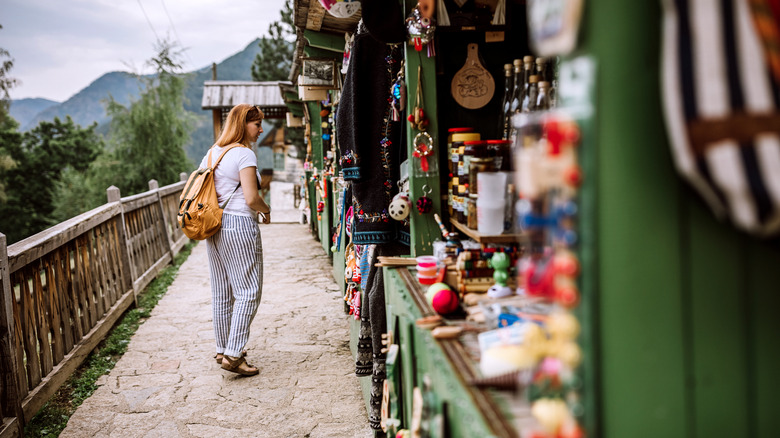Packing Mistakes People Make When Going On Vacation
Gandhi is India's symbol of non-violence and independence, yet few are aware of his minimalistic lifestyle. The man supposedly only had a handful of personal possessions at the time of his death. Which, as you pack for your upcoming vacation, may make you wish you could condense your entire life into the contents of a handbag, Gandhi-style. In reality, your room looks like a whirlwind went through it and your flight's in two hours. You're certain you've forgotten something, yet you get the feeling that you won't recall what it is until it's too late.
Packing well for your vacay is an art, and there is a right and wrong way to do it. Just take a look at the folks holding up the TSA line. One person thought their bottle of Jose Cuervo would pass muster, and another is laden down with all their earthly possessions for a weekend trip. Yet employing all the packing tips you've heard over the years may not seem to make a difference.
Whether you plan to pack light or heavy, effective packing can ease any airport-induced headaches and take a needed bit of travel stress off your backburner. Today, we discuss the biggest packing mistakes you should avoid, with expert solutions and strategies to replace them.
You overpack
Overpacking is a natural instinct with any trip, especially abroad. What if it pours, what if it snows, what if the sky starts raining meatballs? You pack for every contingency until you've got three checked-in bags marked "heavy" for the poor sap on the tarmac.
Think critically about every item you bring. Many, at a fundamental level, are just excess you'll survive for a few days without. If you do end up needing it, consider whether or not you should just purchase it at your destination. Sure, it may be cheaper to bring it with, but having a lighter, less bulky bag is something you can't put a price on. Imagine yourself at your vacation spot, and whether an item could ruin your travel enjoyment should you go without. As the saying goes: "When in doubt, leave it out."
Bring enough clothing for each day of your trip, plus a handful of spares. Avoid going full fashionista unless your destination is a Paris red carpet. One too many travelers nab a set of heels which spend the week in the dark confines of their suitcase because they never dress up.
You don't utilize packing tech
If you haven't been using space bags or packing cubes, you've missed out on one of the world's greatest modern traveling innovations. Space bags use vacuum-sealing tech to compress their contents (usually clothes) down to a fraction of their size. They only require a standard vacuum cleaner to seal them and can easily last several rough-and-tumble journeys. The only downside they present is that while condensed, the weight remains the same. Filling your suitcase with space-bagged items will let you carry more clothes, but the weight will add up surprisingly quickly.
Packing cubes apply a different strategy, compartmentalizing all your gear into soft cubes that fit Tetris-like into standard luggage dimensions. They're the uncontested leader in suitcase organization and make living out of one very doable. Everything has its own space, and gone are the days of ravaging the delicate ecosystem of your checked bag while in search of a single item. Packing cubes do reduce your overall space to a degree, but the dividends in efficiency are well worth it.
These are not mutually exclusive options, either. You can have a layer of clothing in a space bag at the bottom of the suitcase with everything else tucked tightly into a layer of packing cubes. Some packing cubes may even be able to fit your smallest space bags. Whatever you do, we recommend making at least one of the two a permanent addition to your traveling arsenal and top packing strategies.
You have no system for essentials and valuables
Picture this: you're in the TSA line and an officer asks for your passport. It's not in your pocket or your backpack. Instead, you tossed it in your carry-on, and now everyone in line behind you does a synchronized, tired sigh as you root around for it. Don't be that person; keep all your absolute essentials (travel documents, smartphone, etc.) close at hand, preferably in your personal bag. They'll always be within reach, especially in fast-moving lines where airport officials ask to see ID.
Traveling with valuables adds a new dimension of risk to travel. And yes, airport workers do steal from your luggage, as one recent BBC report attests. Travel experts and the TSA reaffirm time and time again that valuables should always go in your carry-ons, never checked luggage. There is little to no recourse for reimbursement for stolen items aside from travel insurance, and the recourse amounts to a protracted back-and-forth with airport security.
Storing valuables in carry-ons isn't just because of the risk of theft, but also because these costly items tend to be fragile. We recommend using a few pairs of backup clothing to secure those breakable items and still make the most of your carry-on space. In the likely event that your carry-on does end up becoming a victim of a last-second boarding check-in, at least you know it won't come out the other side as if it went through a tumble dry.
You pack your shoes without bagging them
The soles of your shoes are perhaps one of the filthiest places on earth. Every time scientists swab them to remind us of this point, they uncover a gut-wrenching amount of harmful bacteria. Makes sense, since God knows what you're walking on just when crossing the street. What doesn't make sense is how the average person chucks them into their suitcase on top of clean clothes and toiletries.
Get yourself a nice pair of reusable shoe bags, and consider maybe cleaning your shoes beforehand. There are plenty of free shoe bag alternatives lying around your house, such as grocery or paper shopping bags. Some suitcases may include an isolated compartment that can be your designated shoe storage space, provided you don't forget its purpose and put clean clothes there later. Avoid using mesh bags, since these naturally won't suffice as a barrier against your soles' dust and grime.
While on the subject, don't neglect using the inside of shoes as extra storage space. You'd be surprised how much you can fit in there. Balled-up pairs of socks, pill bottles, or perhaps delicate glass perfume bottles that need more than just an improvised t-shirt wrapping to cushion them.
You forget a laundry bag
Great travel can be punishing on your clothes. Sweat, sunscreen, spicy foreign food, and city dust conspire to give you a full load of laundry even on a brief trip. Then you make a similar mistake to storing your shoes: you cram this dirty laundry into the suitcase with the clean stuff. As a result, your whole suitcase will acquire a funk that it may just hold on to for future vacations, too.
Buy a laundry bag, or grab any substitute you can find at home. Trash bags, old pillowcases, or even one of your packing cubes are better than nothing. Consider using a deodorizing spray to neutralize unpleasant odors and keep your suitcase smelling good. As a cardinal rule, give those wet clothes time to dry, otherwise, you're making them a prime breeding ground for mildew that could spread to your suitcase's fabric interior.
To be fair, you can get away with leaving the laundry bag at home if (and only if) you can do your laundry when traveling. Check whether your hotel or Airbnb has a washer and dryer on the premises. Coming home with a suitcase of fresh, clean clothes will certainly make the unpacking drudgery a bit less tedious.
You upgrade your wardrobe for the trip
Travels aren't just an escape from the gruel of the nine-to-five, they're a chance to update those old pics on your Instagram. Thus, many a traveler does what seems sensible prior to their trip: they refresh their wardrobe. Sounds great in principle, but maybe hold off on sprinting into H&M with credit card in hand.
A good rule of thumb is to always break in all your clothing before traveling. The last thing you want is to find out that something is ill-fitting on a faraway beach without a retailer in sight, or that your "walking shoes" are actually blister-making machines. Even a quality pair of walking boots needs a proper break-in period to serve you best.
You may find that your outfit combinations don't quite work out as well as you envisioned them, or that the fabric's not ideal for chafing thighs on hot summer days. Save yourself a ton of pain (physically and financially) by giving everything a proper at-home trial run. Comfort and function always beat out aesthetics when it comes to visiting Earth's far corners.
You miss the little essentials
The little things can sometimes make the biggest difference when traveling. Think of that one time you were on an airplane with a headache from the cabin pressure and wished you'd had a painkiller to ease your woes. Turns out there's a whole host of must-haves that solve travel's smaller issues, though most people never think to pack these items.
For example, you should probably bring a pen when going abroad to fill out customs forms instead of fighting for one at the exit funnel. Slip a few snacks into your purse for when you get an attack of the munchies before the onboard meal. If the flight's a long-haul overnighter to East Asia, you'll thank yourself later for a couple of sleeping pills. And when charging spots are in short supply in today's overcrowded airports, a quality power bank will keep your electronics juiced up.
It's helpful to mentally imagine your previous travels and the little pain points that sprung up along the way. Take, for example, a tendency to experience bloating after flying. Simply bringing along a reusable water bottle to stay hydrated will make a world of difference.
You don't protect your luggage
TSA-approved luggage locks are controversial in the world of traveling. On the one hand, they're better than nothing; they're a cheap deterrent to secure your luggage. On the other hand, breaking into one only requires a dedicated bag thief to 3D print the TSA's master key or use the shockingly effective ballpoint pen trick. Some thieves skip the lock entirely and slit open the fabric sides of your bags to access the goodies. Still, we recommend using locks for several reasons.
First, it keeps other passengers out of your bags, especially on the plane. Use one for your under-seat backpack every time you get up to use the bathroom, just in case your seat buddy is a klepto. They're also ideal for any time you need to leave your bags, such as in a hotel lobby or your room. A suitcase with the locks built-in makes the process a lot easier so you never forget your locks at home.
If you don't want to buy a lock (or don't have one), there are other ways to secure your luggage. A classic trick is to plastic-wrap your suitcases at the airport. Plastic wrap takes time and effort to cut through and makes a lot of noise in the process, effectively deterring most who set their sights on your stuff. Also, a simple twist tie or zip tie is better than nothing at all.
You fail to secure messy items
Your baggage should probably wear a wrestling belt because every time it rolls down the conveyor belt it gets the Hulk Hogan treatment. Videos emerge year after year of baggage handlers throwing and slamming luggage as if it owes them money, such as this report from The Guardian demonstrates. It's a good reminder not to check fragile items, sure, but there's something else you should be worried about: the messy items.
Turns out the TSA might be doing you a favor by asking you to keep your three-ounce liquids in a one-quart bag, and not just because it will get you through security faster. If one of those portable shampoo bottles explodes when a handler pile-drives your suitcase, the mess will have nowhere to go but the entire inside of your suitcase. You'll open your bag at the hotel to discover all your clothes soaked in goopy conditioner, or worse.
Buy a quality toiletries bag that you can use for all vacations. Preferably not a mesh one, since these obviously do not protect cracked cologne bottles and their ilk. Liquids aren't the only culprit, either; packets of instant coffee or powdered drink mixes could also go supernova. If it's mess-capable, lock it down.
You don't weigh your bags in advance
Stand in any airport check-in line and you are guaranteed to see one thing: some flustered traveler with their open bags on the ground doing an emergency weight redistribution among their luggage. It's a pain in the rear and embarrassing to show your soon-to-be cabin mates your undies. But, biting the cost of overweight baggage sucks. It's best to weigh your bags before getting to the airport. Hitting that 50-pound limit happens much faster than you realize, even if you're mostly carrying clothes.
Weighing your bag is easy. Just use a standard bathroom scale. If you often struggle to keep your bags under the weight requirement, consider limiting yourself to a medium suitcase. Also, relocate heavier items to your personal bags and carry-ons, as these usually have less restrictive or unenforced weight limitations, and wear your heaviest clothes during the flight. Most importantly, research airline baggage regulations well in advance; some airlines are stricter than others.
You don't give yourself enough time to pack
Packing last minute is a lot like cramming for an exam. It's a great way to send your cortisol through the roof and discover that you've forgotten some essentials only after setting foot on the plane. Packing right will always take longer than you imagine, and you can do it much earlier than you realize. Some people start packing as much as a week or two in advance to assemble a packing list and leave no stone unturned.
At the very least, pack a full day ahead of any trip to give yourself breathing room. Travel is naturally hectic, and there are always at least a couple of departure-day mishaps waiting to befall you. Who knows? You may need to rush to the store for a last-minute purchase, or you may find out that airport-bound traffic is gridlocked and need to leave earlier than expected. Complications like these make last-second packing stress increase tenfold.
If you can't pack everything because you're using some of the items, then pack as much as you can and set your suitcases to the side. Use the time in the interim to mentally run through your trip. Jot down anything you might have missed on your packing list.
You use really old luggage
Good luggage can endure years of hardcore traveling, and some families have inter-generational duffel bags and Samsonites that they dust off again and again for their journeys. Some of these suitcases, though, are in desperate need of retirement. They've got a persistent musky smell, busted handles, and jammed wheels that no longer work. But hey, you might say, if it ain't totally broke, why throw it away? Because this frugal mindset could be causing you more pain than it's worth.
Investing in a brand-new, quality suitcase set makes your travels way easier and more convenient. Get yourself some smooth spinner wheels to negotiate weighty luggage through tight airport lines, and a heavy-duty telescopic handle to support your backpack on its luggage strap. Modern suitcases often feature built-in TSA-approved security locks, expandable zipper sections, and water-resistant seals, all with more sustainable and lightweight materials. Think of it like buying quality shoes over cheap ones from some fast fashion distributor; they'll last longer, serve you better, and weather all the abuse travel can throw at them.
You leave no space for souvenirs
Fridge magnets, engraved shot glasses, and Filipino barrel men await you at your destination. No matter where you go, there will be oodles of souvenirs to choose from. Most people come home from their travels with more than they initially packed. You've likely spotted the problem; pack your suitcases till they're bursting at the seams, and that barrel man you thought would be a funny gift will have to wait for another tourist to adopt it.
Always carve out a bit of space in your suitcases for souvenirs, even if you don't plan to buy any. There's no telling what curios and baubles you'll stumble across in your globetrotting adventures. No one wants to go through the painful process of jettisoning good stuff to make room for that handwoven Chilean poncho you nabbed at a flea market. Once you do partition out that extra space, keep the dimensions in mind to size up potential purchases as you haggle for them with street vendors.
As one little bonus tip, take care not to buy prohibited souvenirs, or souvenirs that look like prohibited items. For example, visitors to Disneyland, according to the OC Register, purchased Coke bottles shaped like thermal detonators ("Star Wars" grenades, for the uninitiated) and then gave the TSA a bit of a scare by trying to take these bottles home on their return flights. Anything that looks like a dangerous, prohibited item is a no-go, and it means more airport personnel rifling through your bags.
